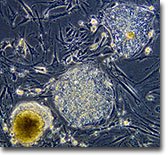TO CLONE OR NOT TO CLONE
 [Whether or not embryos should be cloned and then destroyed for their stem cells has been one of the hottest issues in science this year.
[Whether or not embryos should be cloned and then destroyed for their stem cells has been one of the hottest issues in science this year.
MercatorNet asked James Sherley, an associate professor of biological engineering at the Massachusetts Institute of Technology (MIT), to give his views
Sherley says:
Michael Cook is editor of MercatorNet. He writes from Melbourne.]
#249 Vita Categoria-Eutanasia y Aborto
By Michael Cook
_____________________________
MercatorNet: Professor Sherley, you have been outspoken in your opposition to therapeutic cloning. What’s wrong with destroying a human embryo, especially if this research might benefit people with terrible diseases? James Sherley: Despite the confusion that some like to create on the questions of “are embryos human beings?” and “when does a human life begin?”, both scientists and physicians know very well that human embryos are alive and human. A human life begins when a diploid complement of human DNA is initiated to begin human development. Therefore, a life can be initiated by the fusion of sperm and egg or by the introduction of a diploid nucleus into an enucleated egg (ie, “cloning”). Given that embryos are human beings, they have a right to self and a right to life. Exploiting their parts (ie, cells) or killing them for research is moral trespass that society should not allow. Even if the research might, and let’s be clear, might benefit others, this trespass is not justified.
James Sherley: Despite the confusion that some like to create on the questions of “are embryos human beings?” and “when does a human life begin?”, both scientists and physicians know very well that human embryos are alive and human. A human life begins when a diploid complement of human DNA is initiated to begin human development. Therefore, a life can be initiated by the fusion of sperm and egg or by the introduction of a diploid nucleus into an enucleated egg (ie, “cloning”). Given that embryos are human beings, they have a right to self and a right to life. Exploiting their parts (ie, cells) or killing them for research is moral trespass that society should not allow. Even if the research might, and let’s be clear, might benefit others, this trespass is not justified.
(more...)









0 Comments:
Publicar un comentario
<< Home